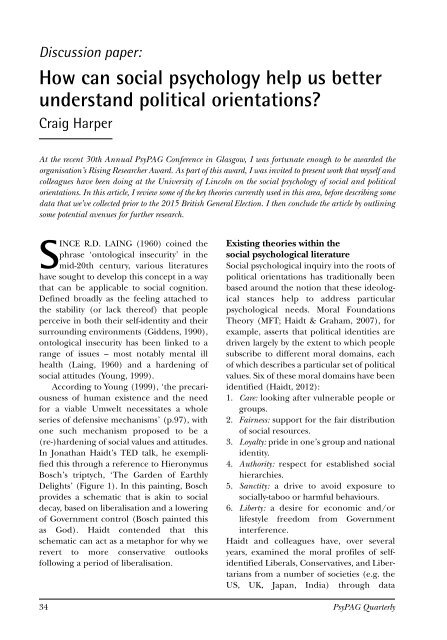Social Psychology Special Issue
PsyPAG-Quarterly-Issue-973
PsyPAG-Quarterly-Issue-973
You also want an ePaper? Increase the reach of your titles
YUMPU automatically turns print PDFs into web optimized ePapers that Google loves.
Discussion paper:<br />
How can social psychology help us better<br />
understand political orientations?<br />
Craig Harper<br />
At the recent 30th Annual PsyPAG Conference in Glasgow, I was fortunate enough to be awarded the<br />
organisation’s Rising Researcher Award. As part of this award, I was invited to present work that myself and<br />
colleagues have been doing at the University of Lincoln on the social psychology of social and political<br />
orientations. In this article, I review some of the key theories currently used in this area, before describing some<br />
data that we’ve collected prior to the 2015 British General Election. I then conclude the article by outlining<br />
some potential avenues for further research.<br />
SINCE R.D. LAING (1960) coined the<br />
phrase ‘ontological insecurity’ in the<br />
mid-20th century, various literatures<br />
have sought to develop this concept in a way<br />
that can be applicable to social cognition.<br />
Defined broadly as the feeling attached to<br />
the stability (or lack thereof) that people<br />
perceive in both their self-identity and their<br />
surrounding environments (Giddens, 1990),<br />
ontological insecurity has been linked to a<br />
range of issues – most notably mental ill<br />
health (Laing, 1960) and a hardening of<br />
social attitudes (Young, 1999).<br />
According to Young (1999), ‘the precariousness<br />
of human existence and the need<br />
for a viable Umwelt necessitates a whole<br />
series of defensive mechanisms’ (p.97), with<br />
one such mechanism proposed to be a<br />
(re-)hardening of social values and attitudes.<br />
In Jonathan Haidt’s TED talk, he exemplified<br />
this through a reference to Hieronymus<br />
Bosch’s triptych, ‘The Garden of Earthly<br />
Delights’ (Figure 1). In this painting, Bosch<br />
provides a schematic that is akin to social<br />
decay, based on liberalisation and a lowering<br />
of Government control (Bosch painted this<br />
as God). Haidt contended that this<br />
schematic can act as a metaphor for why we<br />
revert to more conservative outlooks<br />
following a period of liberalisation.<br />
Existing theories within the<br />
social psychological literature<br />
<strong>Social</strong> psychological inquiry into the roots of<br />
political orientations has traditionally been<br />
based around the notion that these ideological<br />
stances help to address particular<br />
psychological needs. Moral Foundations<br />
Theory (MFT; Haidt & Graham, 2007), for<br />
example, asserts that political identities are<br />
driven largely by the extent to which people<br />
subscribe to different moral domains, each<br />
of which describes a particular set of political<br />
values. Six of these moral domains have been<br />
identified (Haidt, 2012):<br />
1. Care: looking after vulnerable people or<br />
groups.<br />
2. Fairness: support for the fair distribution<br />
of social resources.<br />
3. Loyalty: pride in one’s group and national<br />
identity.<br />
4. Authority: respect for established social<br />
hierarchies.<br />
5. Sanctity: a drive to avoid exposure to<br />
socially-taboo or harmful behaviours.<br />
6. Liberty: a desire for economic and/or<br />
lifestyle freedom from Government<br />
interference.<br />
Haidt and colleagues have, over several<br />
years, examined the moral profiles of selfidentified<br />
Liberals, Conservatives, and Libertarians<br />
from a number of societies (e.g. the<br />
US, UK, Japan, India) through data<br />
34 PsyPAG Quarterly


